Overview
In the demanding world of healthcare, professionals often face overwhelming administrative burdens that can detract from their primary focus—patient care. How can we ease this emotional strain? A medical dictaphone emerges as a powerful ally, streamlining documentation processes and enhancing accuracy. By allowing clinicians to dictate notes quickly, dictaphones significantly reduce documentation time. This efficiency means healthcare providers can devote more time to their patients, ultimately improving the quality of service they deliver.
Imagine the impact of having more moments to connect with patients, to listen, and to provide the compassionate care they deserve. The benefits of adopting dictaphones extend beyond mere convenience; they foster an environment where healthcare professionals can thrive. This not only enhances job satisfaction but also nurtures better patient outcomes.
Are you ready to transform the way you document patient information? Embrace the support that a medical dictaphone can offer. By alleviating the burden of paperwork, you can focus on what truly matters—providing exceptional care to those who need it most. Together, let's take a step towards a more efficient and compassionate healthcare experience.
Introduction
In the fast-paced realm of healthcare, where every second counts, the integration of medical dictaphones has emerged as a transformative solution for efficiency. These innovative devices not only streamline documentation processes but also empower healthcare professionals to concentrate on what truly matters: patient care. As administrative burdens continue to escalate, we must ask ourselves: how can embracing the capabilities of dictaphones change the way medical practitioners manage their time and enhance the quality of care they provide?
Exploring the multifaceted benefits of these tools reveals a pathway to a more effective and compassionate healthcare environment. By alleviating the strain of paperwork, dictaphones allow professionals to focus on their patients' needs, fostering a nurturing atmosphere that prioritizes care. Imagine a workplace where time is spent on healing rather than administrative tasks; this is the promise of integrating dictaphones into daily practice. Let us consider how these devices can not only improve efficiency but also enrich the patient experience.
CosmaNeura: Streamline Administrative Tasks with AI-Powered Solutions
In the demanding world of healthcare, professionals often face overwhelming administrative burdens that detract from their ability to provide compassionate care. CosmaNeura's AI-driven solutions address these emotional challenges by automating essential tasks such as client intake and triage. This automation significantly reduces the time spent on paperwork, allowing medical professionals to devote their energy to what truly matters: delivering high-quality care to their patients.
By enhancing financial efficiency, CosmaNeura's solutions not only alleviate the financial strain on individuals and healthcare providers but also empower them to improve their clinical experiences. Imagine being able to foster better interactions with patients, ultimately leading to improved health outcomes. In 2025, the integration of AI in medical services is anticipated to enhance operations even further, with studies indicating that professionals can reclaim several hours each day previously consumed by administrative tasks.
A case study on CosmaNeura illustrates that organizations adopting these AI solutions not only boost their efficiency but also experience increased job satisfaction. Professionals can spend more time supporting clients rather than getting bogged down by administrative duties. This transformation is crucial, especially when of total medical spending, which can detract from the quality of care and contribute to physician burnout.
What if you could shift your focus back to your patients? By embracing these innovative solutions, you can create a more fulfilling work environment for yourself and your colleagues. Let’s take a step towards a brighter future in healthcare together.
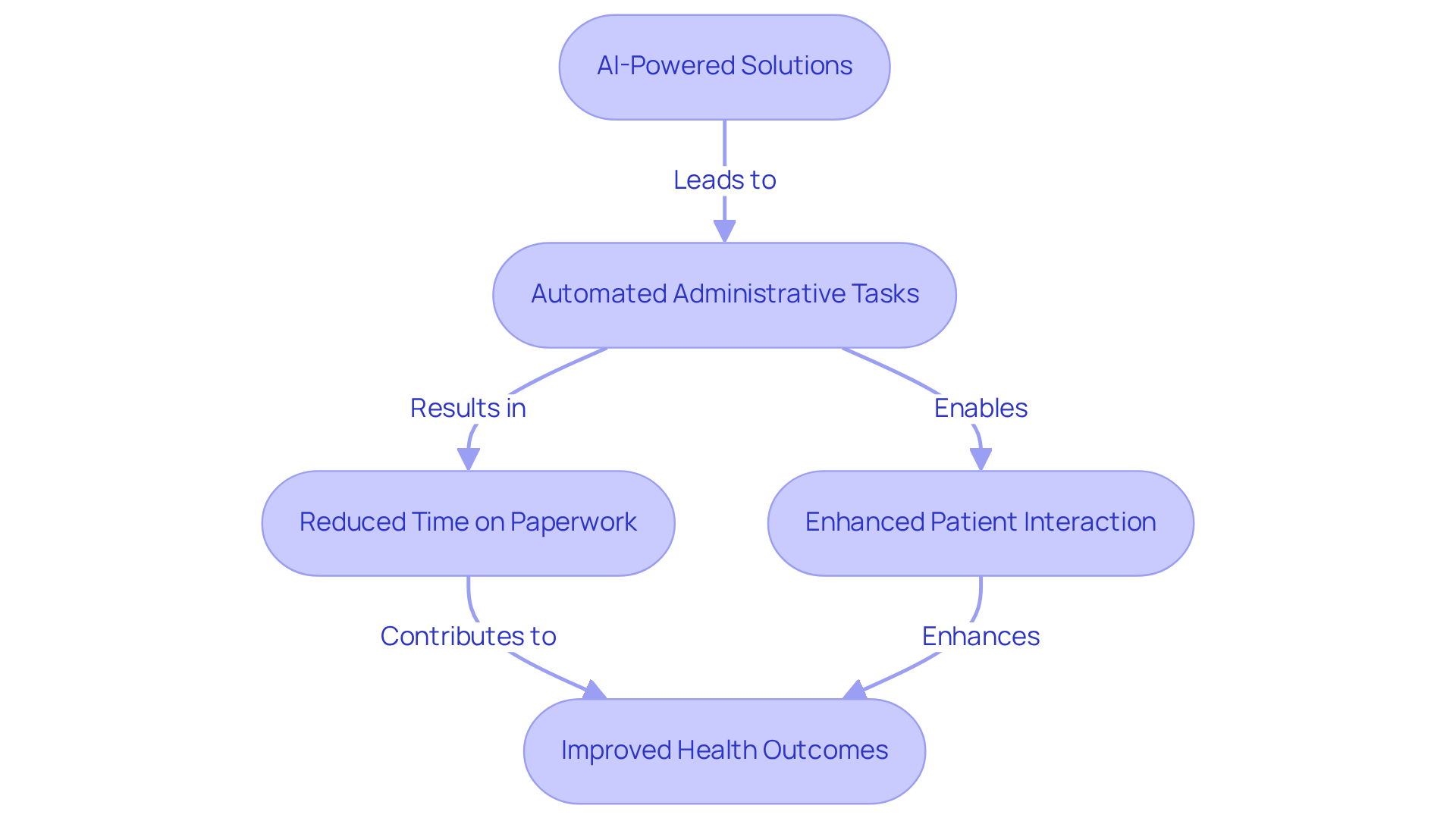
Telehealth Transcription: Ensure Accurate Documentation in Real-Time
In the demanding world of healthcare, providers often face emotional challenges that can weigh heavily on their ability to deliver compassionate care. CosmaNeura's telehealth transcription services provide a solution that includes a medical dictaphone, empowering providers with real-time documentation of interactions. This innovation significantly enhances the accuracy of clinical records, allowing healthcare professionals to engage fully in consultations and create a nurturing environment for their patients.
By utilizing generative AI, these services simplify various administrative tasks such as scheduling appointments and managing medical records. This reduction in administrative load enables clinicians to focus on what truly matters: . As a result, they can build stronger therapeutic rapport and experience greater job satisfaction.
The integration of a medical dictaphone, along with AI-driven documentation tools, not only streamlines the note-taking process but also supports clinicians in maintaining compliance and accuracy in their records. Consequently, professionals encounter diminished cognitive strain, allowing them to concentrate on providing high-quality services while ensuring that documentation is both comprehensive and precise.
Moreover, AI-generated session summaries can be securely stored and reviewed for accuracy within a 30-day window, reinforcing the importance of compliance in documentation. As noted by Tahara DeBarrows, a Licensed Marriage and Family Therapist, 'AI summarization has significantly improved the efficiency and accuracy of my note-taking.' This highlights the transformative impact of these tools on clinical practice.
Are you ready to alleviate some of your administrative burdens and enhance your practice? Embrace the change that CosmaNeura's telehealth transcription services can bring to your professional life.
AI Diagnostic Guidance: Enhance Clinical Decision-Making for Providers
In today's healthcare landscape, many providers face emotional challenges that can impact their ability to deliver the best care. CosmaNeura's AI diagnostic guidance offers a compassionate solution by analyzing interactions and providing differential diagnostic suggestions. This innovative support system empowers medical professionals to make informed clinical decisions, ultimately improving the quality of services offered to individuals.
Currently, CosmaNeura is conducting a pilot test with three doctors, showcasing the transformative potential of AI-driven solutions in enhancing personalized patient care, particularly in faith-based medical environments. The integration of AI into medical services is expected to significantly boost diagnostic accuracy. Research indicates that AI tools can match the diagnostic precision of the top 25% of physicians. Furthermore, 56% of medical professionals believe that AI will enhance the quality of diagnoses, reflecting a growing trust in these technologies.
Consider how AI-powered diagnostic assistance tools can alleviate the burden of administrative tasks. By streamlining workflows, these tools enable practitioners to focus more on what truly matters—healthcare. This shift not only enhances efficiency but also fosters a more responsive medical environment, allowing professionals to meet individuals' needs effectively.
In light of these benefits, it’s crucial to reflect on how we can embrace these advancements. By addressing administrative challenges and incorporating AI solutions, healthcare providers can create a nurturing atmosphere that prioritizes patient care. Together, let’s explore how these innovations can for both providers and patients alike.
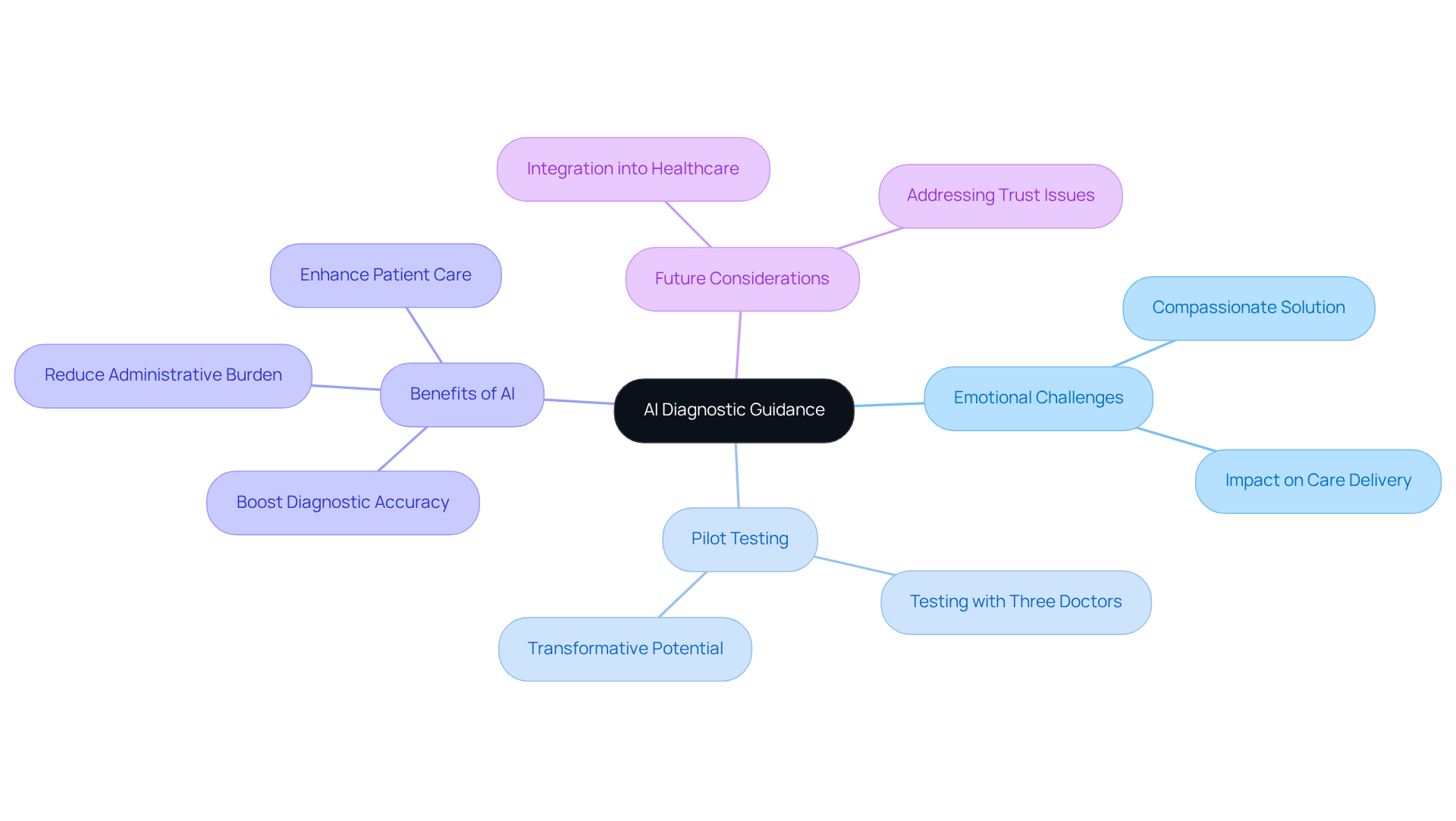
Billing Optimization: Maximize Revenue with AI-Driven Suggestions
Healthcare providers often face emotional challenges as they navigate the complexities of billing and revenue management. CosmaNeura's AI-driven billing optimization tools offer a compassionate solution, playing a crucial role in maximizing revenue for professionals dedicated to patient care. By analyzing current client interactions, the platform suggests precise billing codes that enhance revenue potential, alleviating some of the burdens that can detract from patient support.
This proactive approach is complemented by retrospective billing analysis, which identifies past opportunities for revenue recovery. Such strategies are vital, as studies indicate that hospitals in the U.S. lose approximately $20 billion annually due to claim denials. This staggering figure underscores the importance of accurate billing practices, which can greatly impact a healthcare provider’s ability to serve their patients effectively.
Moreover, the capacity of AI to optimize billing procedures can lead to a remarkable decrease in administrative expenses—by 30-35 hours weekly, as shown by the Fresno community health network. This significant reduction allows practitioners to concentrate more on patient support, ensuring their financial well-being remains strong.
With a medical dictaphone, medical professionals can while significantly increasing their overall revenue. For instance, Ken Kubisty reported a 15% revenue rise after adopting the Patient Access Curator. This incorporation of AI into medical practice management aligns with CosmaNeura's dedication to Catholic teachings, ensuring that financial practices uphold ethical standards while improving service delivery.
As you consider these solutions, reflect on how they can transform your practice. Embracing AI-driven tools not only fosters financial health but also allows you to focus on what truly matters—your patients. Together, we can navigate these challenges and improve the care you provide.
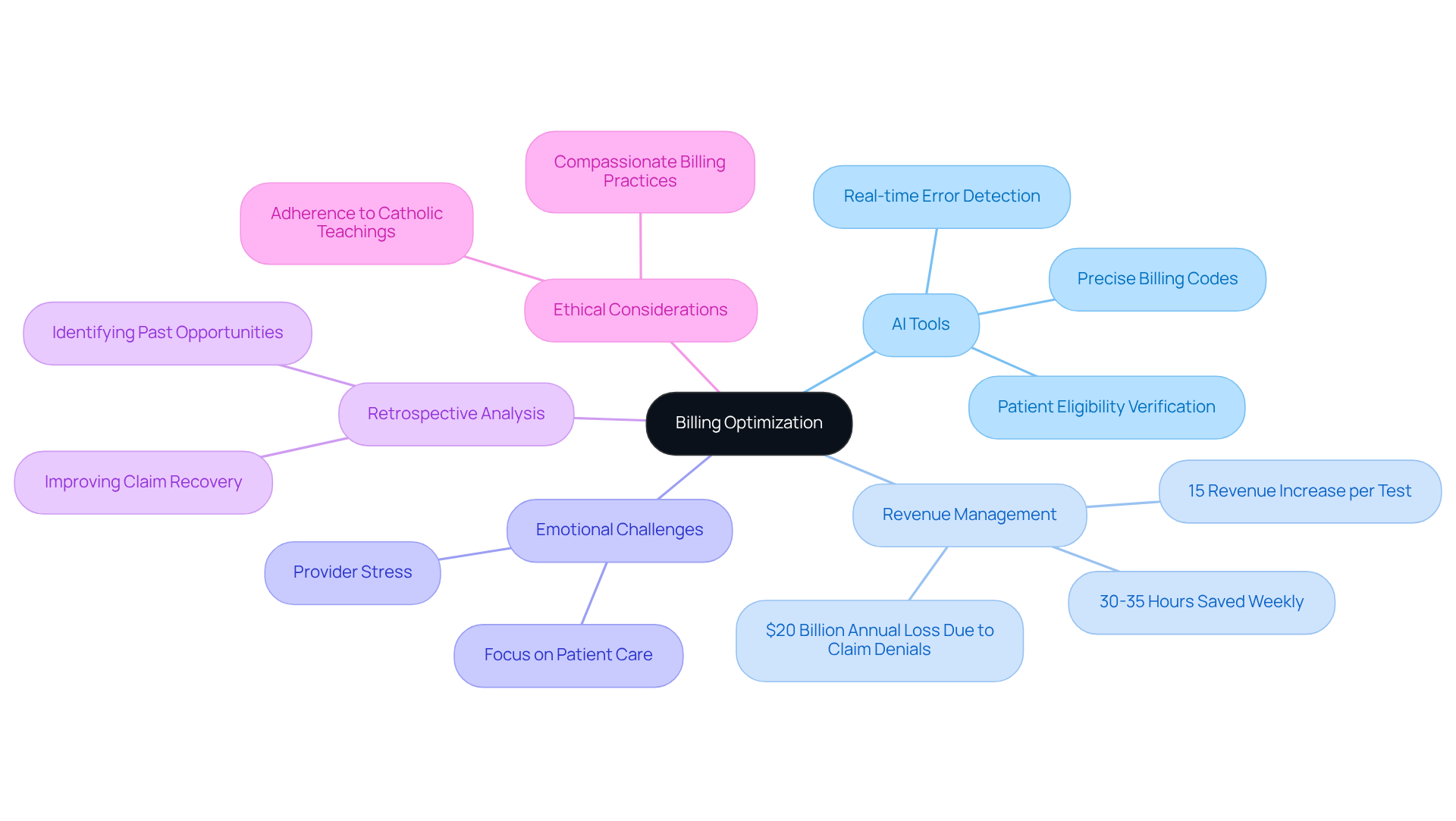
Time Efficiency: Reclaim Hours for Patient Care with AI Solutions
Healthcare providers often face overwhelming administrative burdens that can detract from their core mission: patient care. By automating routine administrative tasks, CosmaNeura allows these dedicated professionals to reclaim several hours each day. This precious time can be redirected towards client support, fostering stronger connections that enhance both satisfaction and results.
Imagine the difference it could make—more time to listen, to understand, and to truly connect with patients. With less time spent on paperwork, healthcare providers can focus on what matters most: . This shift not only improves the quality of care but also nurtures a more fulfilling work environment.
Consider how you could transform your practice with this newfound time. Embrace the opportunity to deepen relationships with your clients and elevate their experience. Let’s explore how CosmaNeura can support you in this vital journey towards better patient care.
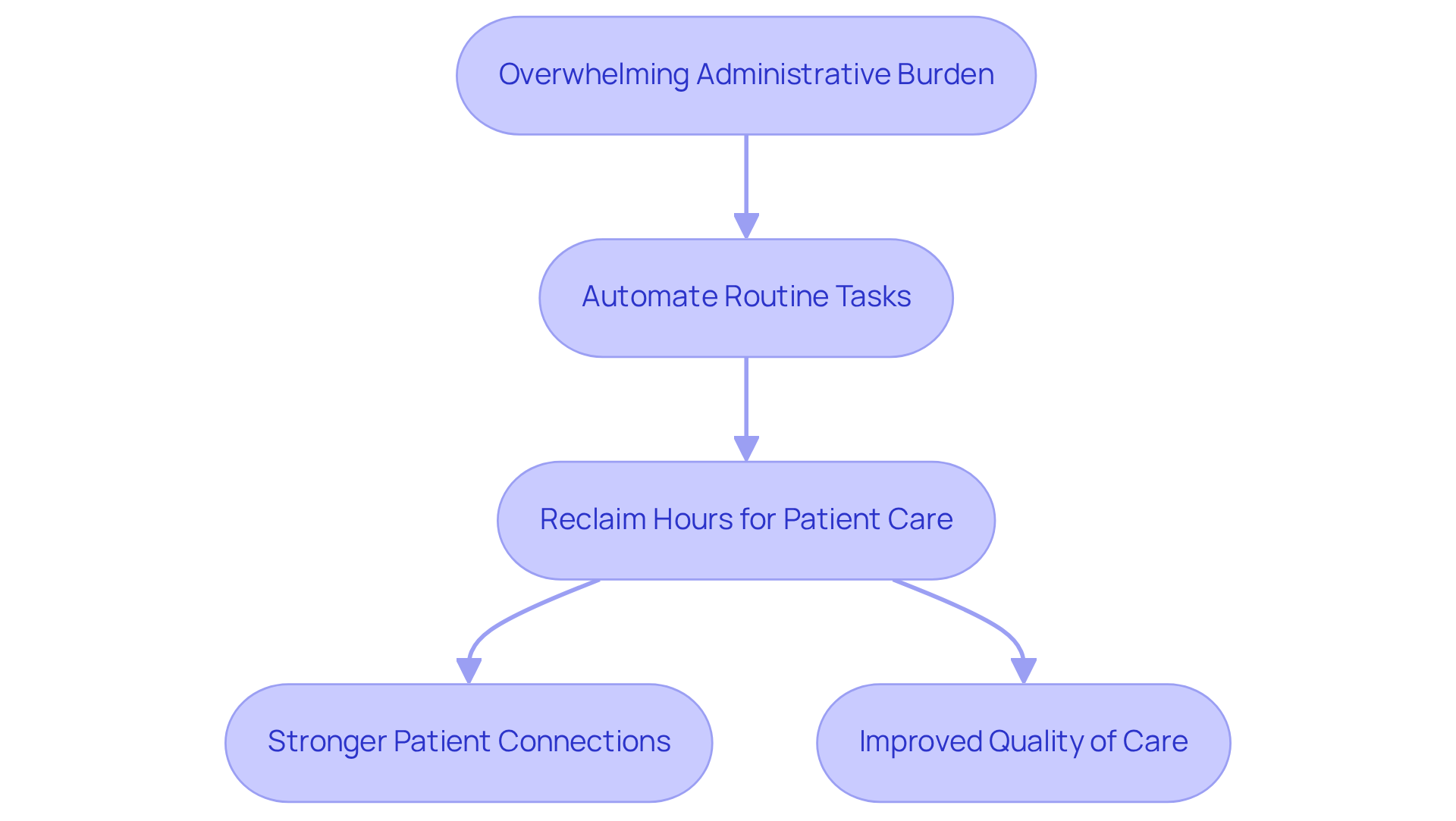
Job Satisfaction: Reduce Administrative Burden and Enhance Provider Wellbeing
Healthcare providers often face overwhelming administrative burdens that can lead to significant job dissatisfaction. Have you ever felt that paperwork takes away from the time you could spend with your patients? CosmaNeura's AI solutions aim to alleviate this stress, streamlining tasks such as patient intake, administration, and triage. This shift allows clinicians to dedicate more time to patient care, fostering a more fulfilling work environment and enhancing professional wellbeing.
Insights from over 40 customer interviews reveal that excessive administrative tasks contribute to job stress, with 12.7% of physicians identifying them as a primary source of dissatisfaction. In Pakistan, 14% of medical professionals reported similar feelings. In contrast, those who focus on their primary duties report greater job satisfaction and involvement. As one medical practitioner shared, "Concentrating on client support instead of documentation has changed my practice and enhanced my connections with clients."
By relieving these burdens, CosmaNeura enables practitioners to nurture meaningful patient relationships, ultimately benefiting both practitioners and patients. To maximize these benefits, medical organizations should consider like CosmaNeura. Streamlining administrative processes can enhance patient-focused support, allowing healthcare providers to thrive in their roles and truly connect with those they serve.
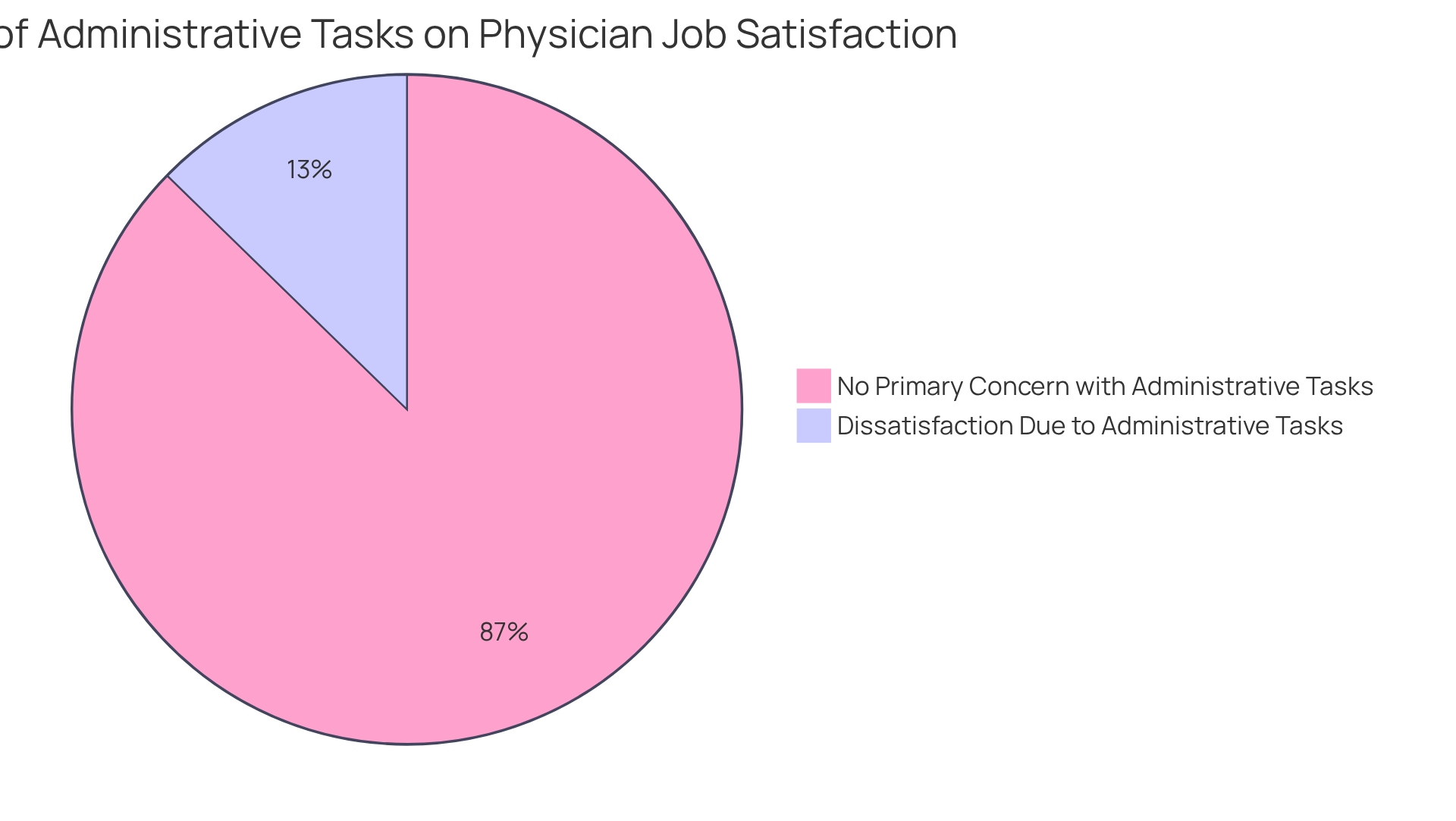
Ethical Compliance: Uphold Catholic Values in Healthcare Practices
At CosmaNeura, we understand the emotional challenges healthcare providers face in today's complex medical landscape. Our commitment to ensuring that AI solutions are deeply rooted in Catholic teachings reinforces ethical medical practices, providing a nurturing framework for professionals. This thoughtful design empowers medical practitioners to deliver services that are not only effective but also ethically responsible, allowing them to care for their patients with compassion.
By aligning operations with the core values of the Catholic faith, CosmaNeura helps providers navigate the intricate realities of modern medical practice while staying true to their ethical beliefs. This integration of values is crucial, as highlighted by Pope Benedict XVI, who emphasized the Church's three-fold responsibility:
- Proclaiming the word of God
- Celebrating the sacraments
- Exercising the ministry of charity
Such a holistic approach ensures that medical delivery remains compassionate and aligned with the teachings of the Church.
Imagine a healthcare environment where every decision reflects both expertise and ethical commitment. This alignment not only enhances the quality of care for patients but also fosters a sense of fulfillment among providers. By choosing CosmaNeura, you embrace a path that honors your values and supports your mission in healthcare. Together, we can create a .
History of Dictaphones: Understanding Their Role in Healthcare Documentation
For decades, dictaphones have been essential in medical documentation, evolving from simple tape recorders to sophisticated digital devices. Introduced in the late 19th century by Thomas Edison, the phonograph laid the foundation for future advancements. By the 1950s, magnetic tape dictating machines became popular, offering improved sound quality and portability. The 1980s and 1990s ushered in a significant transformation with medical dictaphone systems, which replaced analog tapes with digital recordings that enhanced clarity and efficiency in medical transcription.
Today, modern dictaphones are equipped with , achieving over 99% accuracy and enabling medical professionals to dictate notes directly into electronic health record (EHR) systems. This evolution has dramatically improved the efficiency of medical documentation, allowing clinicians to reclaim precious hours each day that were once spent on manual note-taking. By automating documentation tasks and integrating seamlessly with EHR systems, these tools empower clinicians to focus more on patient interactions, ultimately enhancing the quality of care and addressing the pressing issue of physician burnout.
The integration of dictaphones into medical practices is supported by various studies that underscore their effectiveness in streamlining documentation processes. For instance, medical professionals using dictaphones for clinical documentation report significant improvements in precision and communication among providers. Some studies even suggest a reduction in documentation time by as much as 30%. As the healthcare landscape continues to evolve, dictaphones remain a vital resource, adapting to meet the demands of modern clinical practice while ensuring that patient care remains the top priority. By harnessing AI, dictaphones not only enhance documentation efficiency but also foster a more patient-centered approach in medicine.
How can we continue to support healthcare providers in their daily challenges? The advancements in dictation technology provide a pathway to alleviate some of the burdens, allowing for a more compassionate and effective healthcare environment.
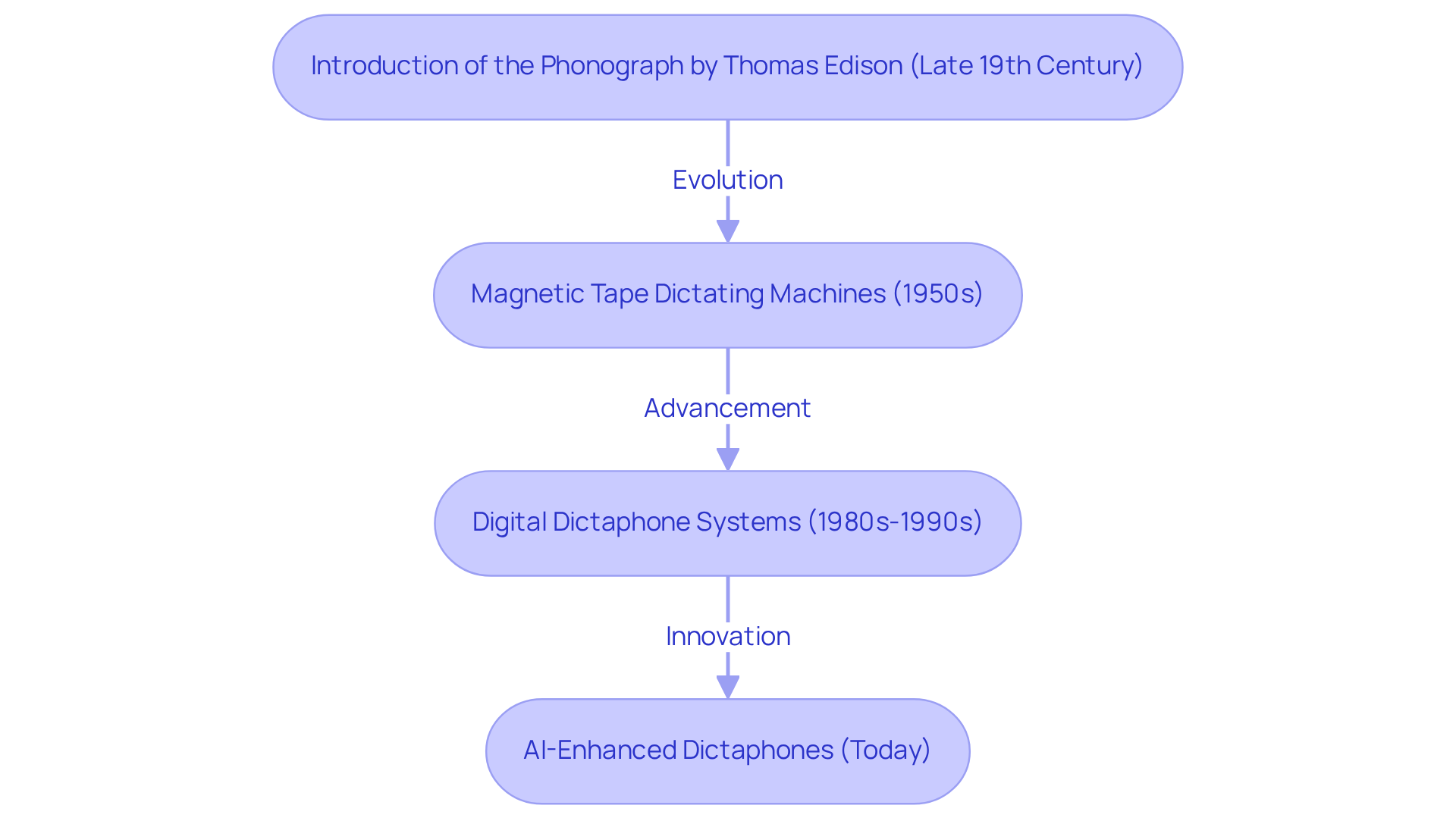
Applications of Dictaphones: Versatile Tools for Healthcare Providers
A medical dictaphone serves as an invaluable tool for medical professionals, addressing the emotional challenges they face in their daily routines. These devices allow for various uses, such as recording client notes, dictating prescriptions, and summarizing consultations. With their user-friendly design, clinicians can document information swiftly and accurately, which significantly enhances workflow efficiency.
Have you ever felt overwhelmed by administrative tasks? Statistics show that many healthcare professionals prefer the medical dictaphone over traditional typing methods. In fact, studies indicate that medical documentation using speech recognition software takes an average of just 5.11 minutes to complete, compared to 8.9 minutes for typing. This time-saving feature enables healthcare professionals to dedicate more time to patient interactions, ultimately improving the .
Healthcare professionals have expressed their appreciation for the versatility of dictaphones. One clinician noted that using dictation software specifically designed for the medical field reduces transcription mistakes by accurately understanding medical terminology and abbreviations. Another supplier highlighted the seamless integration of dictation tools with electronic health record (EHR) systems, which streamlines workflow and boosts productivity. These insights underscore the essential role of medical dictaphones in today's medical environments. They allow practitioners to focus more on individual support while effectively managing documentation.
Imagine a day where you can spend more time with your patients and less on paperwork. By embracing tools like a medical dictaphone, you can enhance your practice and improve patient care. Let's explore how the use of a medical dictaphone can transform your workflow and support your commitment to quality healthcare.
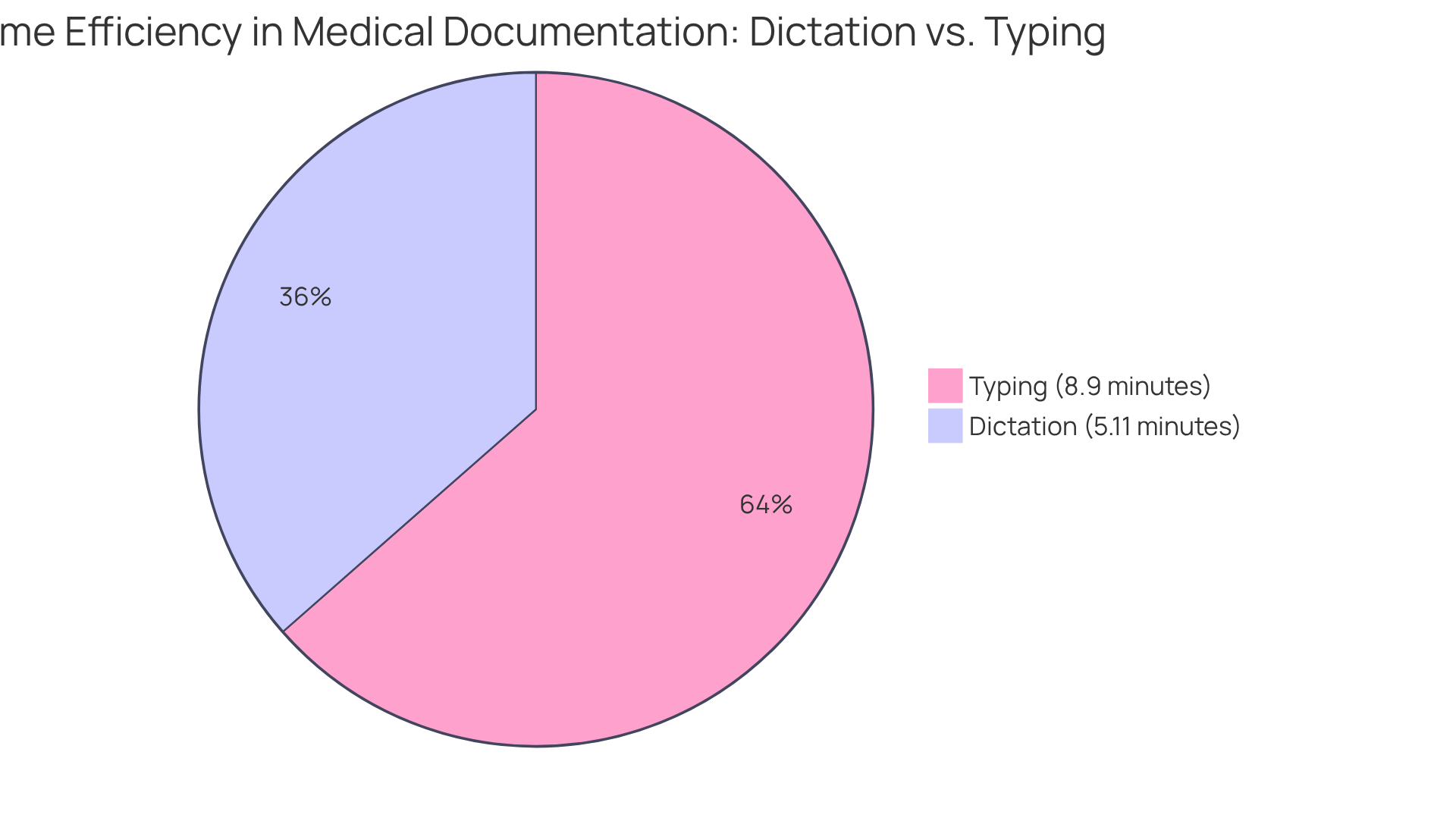
Benefits of Dictaphones: Enhance Efficiency and Accuracy in Medical Documentation
Healthcare providers often face overwhelming administrative burdens that can detract from their ability to deliver compassionate care. The integration of medical dictaphones in medical documentation offers a promising solution, significantly enhancing both efficiency and accuracy. By allowing clinicians to dictate notes instead of writing them, the medical dictaphone simplifies the documentation process, enabling healthcare professionals to dedicate more time to patient care. Research suggests that those utilizing dictation technology can conserve up to 9.7% of their documentation time, resulting in valuable hours that can be redirected towards meaningful interactions with individuals.
Moreover, medical dictaphones play a crucial role in improving the accuracy of medical records. Studies indicate that 40% of the words in final clinical notes are included during the editing phase, underscoring the importance of effective dictation in capturing comprehensive information about patients. Many clinicians report that using a medical dictaphone not only reduces the time spent on paperwork but also enhances the thoroughness of their notes, ultimately leading to better outcomes for individuals.
Imagine the impact of further reducing administrative loads through the use of generative AI in medical dictaphones. This technology enables healthcare professionals to focus on with those they serve and understanding their unique needs. Quotes from medical providers illustrate the positive influence of the medical dictaphone on their workflow. Many clinicians express that the ability to use a medical dictaphone for dictating notes allows them to engage more deeply with patients, enabling them to concentrate on the interaction rather than the administrative burden of documentation. This shift not only enhances job satisfaction but also fosters a more compassionate approach to patient care, aligning with the core values of healthcare professionals.
However, it is essential to recognize that challenges such as concerns about accuracy and the need for editing may arise with the use of dictation technology. Addressing these issues is vital to maximizing the benefits of this innovative approach. By embracing the medical dictaphone, healthcare providers can transform their documentation processes, ultimately leading to more compassionate and effective patient care.
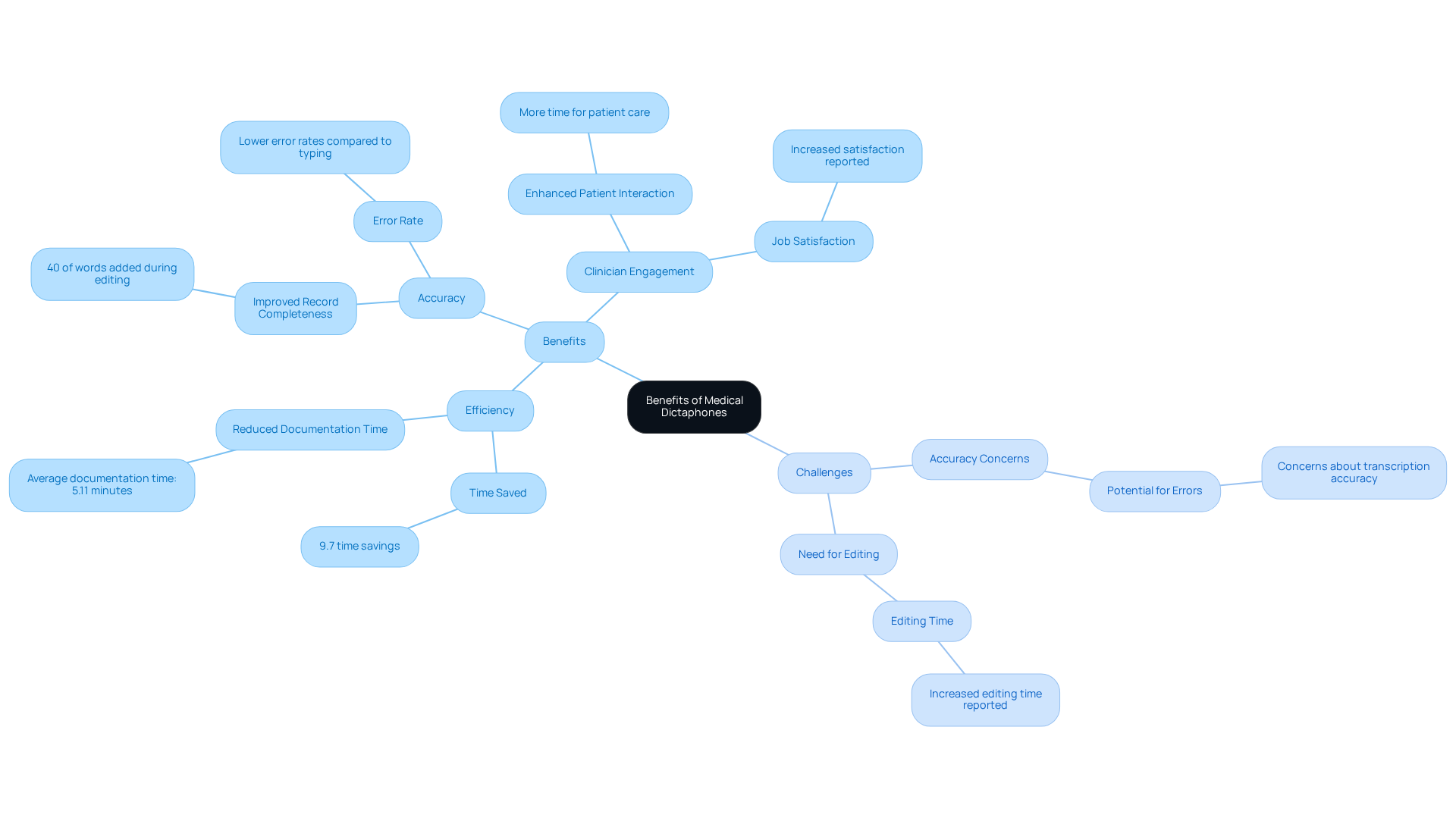
Conclusion
The transformative potential of medical dictaphones in enhancing healthcare efficiency truly resonates with the challenges faced by healthcare professionals today. Imagine reducing the time spent on administrative tasks, allowing you to focus on what really matters: patient care. The evolution of dictaphones, now supported by AI technology, offers a streamlined approach to documentation. This means clinicians can engage more fully with their patients while maintaining accurate and comprehensive records.
Key insights reveal that medical dictaphones not only improve documentation accuracy but also enhance workflow efficiency. This ultimately fosters a more compassionate healthcare environment. By adopting AI-driven solutions, such as telehealth transcription and diagnostic assistance, providers can optimize their time and resources. These innovations lead to better job satisfaction among healthcare professionals and contribute to improved patient outcomes, addressing the emotional and ethical challenges prevalent in modern medical practice.
In light of these advancements, it is essential for healthcare providers to embrace the capabilities of medical dictaphones and AI solutions. Doing so allows you to reclaim valuable hours for patient interaction, reduce administrative burdens, and uphold the ethical standards central to compassionate care. The journey toward a more efficient and fulfilling healthcare experience begins with a commitment to innovative tools prioritizing both provider wellbeing and patient satisfaction. Together, let’s redefine the future of healthcare, ensuring that every interaction reflects the core values of compassion, accuracy, and efficiency.




